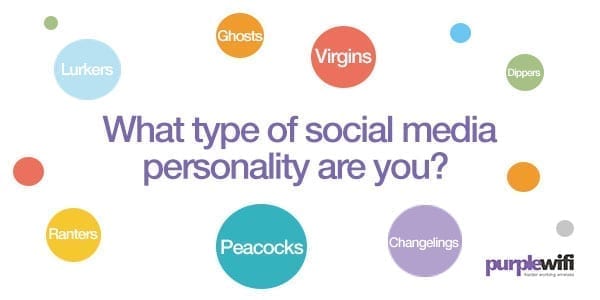In one of our earlier blogs, The Psychology of Social Media, we looked at how we may or may not be showing our true self when we are posting online. The total pieces of content shared per month on Facebook currently stands at 70 billion and the average amount of tweets per day at an amazing 190 million. It’s no wonder that we will be influenced by what others seem to be doing.
There are many different types of social media posts to watch out for
Social media sites are sometimes an opportunity to write about an amazing time a person has just experienced whilst simultaneously changing the world in a day. There are also the fairly amusing ‘one-up’ sharers who will comment constantly to prove that they are more superior than anyone else.
Other differences occur between Extrovert and Introvert posters. Extroverts love to share all that they can, often with big groups of people. They enjoy being the centre of attention. Introverts are more likely to favour quality over quantity and tend to think more before they post.
What kind of sharer are you?
Michael Sebastian shared an interesting infographic about personalities on social media created by bank First Direct:
1) Virgins are new to the social media game, but they will evolve in time into one of the other types of sharer
2) Ghosts do have a profile …… but an anonymous one. They share very little information about themselves, have every privacy setting possible, and not a picture in sight!
3) Lurkers fear they are not interesting enough. They may post something but then take it off straight away. They are the observers of others online.
4) Deniers say that social media doesn’t affect their lives……. but would become anxious if they were told that they had to deactivate their accounts.
5) Dippers access their page infrequently but nevertheless have a profile, just in case!
6) Changelings completely change their ‘real’ personality on social networks to be something that they are not. Anyone who knows them in real life will quickly realise this alter ego couldn’t be further from the truth. One amusing interpretation is by a mother who doesn’t believe the posts of changelings and suggests the real meaning behind stereotypical Facebook posts.
7) Approval Seekers constantly check for ‘likes,’ re-tweets and endorsements to make them feel popular.
8) Quizzers love to ask a question in order to provoke a response and start a conversation.
9) Ranters are usually meek in real life but they become highly opinionated online.
10) The Informers love to share all their latest ‘stuff’ with us, trying to be the first to know everything and share something interesting to get lots of ‘wows.’
11) Peacocks aspire to gaining more followers than friends to show how popular they are, accepting every ‘friend request’ and ‘follow’. Online success means getting the MOST likes and retweets.
12) The Ultras are social media obsessed, checking their news feeds more often than they speak: while out for meals, at the bus stop, before they sleep and even in the middle of the night.
Other peoples lives are so ‘fantastic’
So, could social media posts be making us jealous? Are we going to gauge how happy other people’s lives are from the ‘Extrovert Informers’?
The grass is not always greener!
If we were to believe everything that was portrayed on Facebook and think we had to keep up, we would surely find it difficult to cope. Thanks to the ‘Informers’ and ‘Peacocks’ posting about their amazing holiday destinations, their perfect relationships with EVERYONE and reporting success in all they do, a dose of the Green Eyed Monster can be the result.
Jealousy could be good for you
Jealousy is often seen negatively, but it’s important to remember that social media is an environment where people create a carefully projected ‘perfect’ image of themselves. It is reassuring to know that everyone gets jealous at one time or another and a little bit of it could actually be beneficial. In times gone by, jealousy has reduced the chance of desertion by one’s mate and kept a family together. Seeing what other people are doing can encourage you to try out new things: strive for that better job, move house, travel more.
Fear of missing out
FOMO as it has become known, is a phenomenon that social media has brought to the fore. It is a grave fear that we are going to miss out on some sort of social event that will later be posted on our social media timeline. FOMO is a real anxiety, or an obsession in extreme cases. It is more common in people who report that they want to be loved more than they feel they are.
If you think you might have FOMO then listen up! Tim Otis says ‘that when we have access and visibility to what others are doing at every second of the day, it can (and does) create feelings of feeling less than someone else’.
Tim’s advice: Put things in perspective and realise that you are doing things that other people aren’t. Realise that life isn’t actually that glamorous; people usually just post the great moments and pick the best picture from many to create a great image. Be contented to have a healthy relationship with social media and appreciate the things you do have and use it to better yourself:
‘Use people’s posts to motivate you, not demotivate you’.
